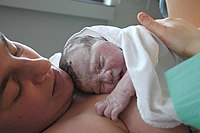
Photo from wikipedia
OBJECTIVE This study evaluates how extended childbirth education intervention affects first-time mothers' fear of childbirth and its manifestation during pregnancy. METHOD A randomised controlled trial was conducted. A total of… Click to show full abstract
OBJECTIVE This study evaluates how extended childbirth education intervention affects first-time mothers' fear of childbirth and its manifestation during pregnancy. METHOD A randomised controlled trial was conducted. A total of 659 first-time mothers were recruited before week 14 of gestation during the first ultrasound screening at the hospital's maternity outpatient clinic. The mothers were randomly assigned into an intervention group (n = 338) or a control group (n = 321). The control group received all available regular childbirth education. In addition, the intervention group received an enhanced 2-hour childbirth education at the maternity hospital. OUTCOME MEASUREMENTS AND STATISTICAL ANALYSIS The objects of childbirth fears (childbirth-related fear, fear for the mother's and the child's well-being, fear related to Caesarean section) were the primary outcomes. The manifestations of childbirth fears (everyday life, stress symptoms and the wish to have a Caesarean section) were the secondary outcomes. These outcomes were measured over 34 weeks of gestation using two parts of the instrument 'Feelings of Fear and Security Associated with Pregnancy and Childbirth'. Logistic and ordinal linear regression models were used to model the effect of the intervention on the outcomes. FINDINGS The mothers in the intervention group had less childbirth-related fear than those in the control group [odds ratio (OR) 0.58, 95% confidence level (CL) 0.38-0.88]. Also, fear influenced the mothers in the intervention group less in everyday life than it did the mothers in the control group [OR 0.64, 95% CL 0.44-0.94]. CONCLUSION The effectiveness of the intervention can be considered moderate: one of three objects and one of three manifestations of fears were reduced. The intervention proved most efficient in alleviating relatively limited objects of fears.
Journal Title: Scandinavian Journal of Caring Sciences
Year Published: 2017
Link to full text (if available)
Share on Social Media: Sign Up to like & get
recommendations!